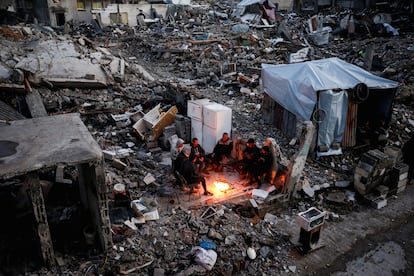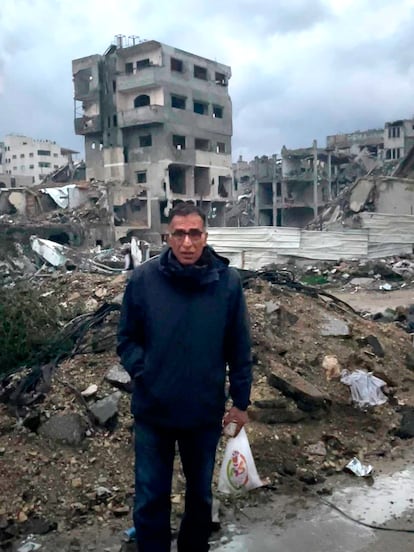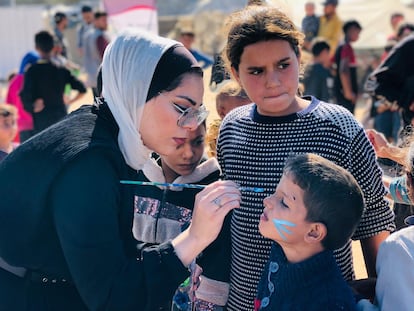Why I want to stay in Gaza: Palestinians respond to Trump
Israeli bombardment has robbed them of loved ones, homes and livelihoods, and the ceasefire has allowed them to see the extent of the destruction. Still, in spite of everything, the Gaza Strip is where most Palestinians want to see their children grow up


“If I had any doubts left, they’re gone, thanks to Donald Trump.” The message from Anas Abu Yussef, a Gaza shopkeeper, comes after the U.S. president’s announcement that he will “take control” of the Gaza Strip and turn it into the “Riviera of the Middle East” after forcibly and “permanently” displacing its inhabitants. “I want to stay here,” he adds. “Even if I had the chance to leave I wouldn’t because I know I wouldn’t be able to return. My grandparents were refugees and since I was a child I have known what it is to lack roots, the nostalgia of it.... This is our home and my children will grow up in Gaza,” he tells EL PAÍS.
Yussef, 35, is married with two children aged seven and five. He has survived more than 10 months in the south, where he found shelter in three different apartments before ending up in an Internally Displaced Persons (IDP) camp, where his children were hungry, cold and afraid. “All we could think about was going home,” he says. He returned as soon as the January ceasefire was declared and Israeli troops allowed people to pass between the south and the north. More than 580,000 Gazans have made the same journey. When he returned, he found his house and his small grocery store in the Al Nasr neighborhood of Gaza City o. It didn’t come as a surprise because his neighbors had sent him photos. However, seeing it for himself was devastating. For him and tens of thousands of Palestinians, these ruins, without history or value, represent much more than a pile of rubble.
“I hope Trump’s words are just words, though the US and Israel have been wanting Gazans to vanish from Gaza for decades,” he says. “Still, look at us! There are now more than two million of us.”
Since the end of January, Yussef has made several trips back and forth alone, between the south and the north, to clear a plot of land for his family. They are now camped next to the ruins of their home, in the same tent that sheltered them in the IDP camp.
The UN estimates that 92% of Gaza’s homes are either totally or partially destroyed and that 1.8 million people out of 2.1 million need a roof over their heads, or at least basic necessities to resettle.
Survival mode
“Trump has no right to decide if I have to leave Gaza,” says Georgette Harb, 38, a translator and project coordinator for NGOs. “But if no one puts their foot down, and the world doesn’t show a little solidarity and support for the Palestinians, he will act on those words. And unfortunately, we are very much alone.”
Would you leave behind the memories and the life you had or would you stay and try to move on? I think leaving now would make me feel like a loser forever”Georgette Harb, translator and NGO worker
Harb spent six years investing her savings in the apartment she lived in with her husband, Islam, in Gaza City. “Now I am homeless and live in a miserable tent,” she says. “I would like to ask you back so you could tell me what you would do if you were me — would you leave behind the memories and the life you had or would you stay and try to move on? I think leaving now would make me feel like a loser forever.”
On February 10, Trump demanded that the Islamist Hamas movement hand over all the remaining Israeli hostages it took on October 7, 2023, or “all hell is going to break out.” There are about 70 hostages left, according to the UN, and they are being released in small groups in exchange for Palestinian prisoners and the safe passage into Gaza of humanitarian aid.
“I don’t know what’s going to become of us, I don’t know what’s coming next or where I’m going to start over,” Harb says. “I can’t imagine a future, I don’t even know where I will be in a few days’ time. I just want to recover psychologically and financially because we have lost everything.”
Harb continues to live with her husband in a displaced persons camp in the Al-Mawasi area in south-central Gaza, where tens of thousands of people fought for space as the bombs fell.
Hani Al Askary, 35, is also camping out near the central town of Deir el-Balah because his former home in the north was leveled in December 2023. “But I will go back, we will all go back. We will rebuild our homes and create a life that will be even better than the one we had before. We Palestinians are resilient, determined and capable people. We are used to surviving,” he tells EL PAÍS.
Between October 2023 and April 2024, some 80,000 Palestinians were able to leave Gaza via Egypt, thanks to foreign passports or safe-conduct, according to UN figures. Subsequently, Israel closed this route to the outside world and only a few extreme humanitarian cases were allowed to leave. Now, with the ceasefire, wounded people are being evacuated. According to the World Health Organization (WHO), at least 12,000 patients need to be transferred out of Gaza for medical treatment.
“There is only one place in the world that holds our roots and our history. I can’t even imagine someone depriving me of that forever,” explains Al Askary, who works for the Palestinian Center for Human Rights (PCHR). “Given the chance, the people of Gaza are perfectly capable of transforming this land into the most beautiful place in the world, if only Israel would stop harassing us. We are only asking for the minimum human rights enshrined in international law.”
But when he hears Trump refer to the real estate project he has in mind for Gaza, Al Askary’s optimism wavers. He thinks of his grandparents and their hasty flight during the Nakba in 1948 from the village of Bayt Daras, located some 30 miles north of Gaza. “It’s a nightmare that Israel and the United States want to re-enact,” he says. “Statements like this only strengthen our determination to stay, but they should also trigger a firm response from the international community. We are talking about massively displacing and killing innocent people just to fulfill their desire to occupy our land.”

A complete rebuild
Mustafa Ibrahim, 62, has witnessed the progressive deterioration of the humanitarian situation in Gaza over the past 25 years and is fearful for its future. To him, Trump’s words sound like ethnic cleansing. “My father was expelled from a village called Burayr. It’s about 20 kilometers from Gaza. I know what it’s like to be a refugee, I don’t want to be a refugee again. This is the talk of a racist, populist man, who does not believe in human rights, let alone the right to self-determination for Palestinians,” he adds.
Ibrahim is a journalist, but he has been too distressed to write for weeks. He is also a political analyst and one of the heads of the NGO Addameer, which defends the rights of prisoners, both in Israeli and Palestinian jails. He has spent eight months displaced in the south and returned to Gaza City a few days ago, in a donkey cart. “My son died here. He didn’t want to leave because his wife was going to give birth to their second child. Israel killed him and bombed my house. I am not a special case; all families have had painful losses over these months.”

Ibrahim now lives with his wife and seven children in a small shop. It is a basic affair. He describes the pain he feels when he looks at a city he does not recognize and sends several photos to try to explain the desolation that surrounds him. In some of the photos, he himself appears, a gaunt man with a sunken look that has little to do with his WhatsApp profile picture, taken before the war. “The destruction is widespread, but the Palestinians are clinging to this place and are determined to survive. It will cost a lot of money and a lot of effort to start over, but I still believe that our life is here,” he says.
It’s hard to say whether I would have left Gaza during the war if I had had the chance, but I don’t think so. Those who leave don’t come back”Kholoud Shawish, university graduate
How does a 22-year-old girl imagine her future in Gaza? Kholoud Shawish is slow to answer. “I think the next five years or more are going to be very hard, but we will be able to rebuild everything that was standing before the war,” she says.
Shawish has just graduated from Gaza’s Al-Azhar University with a degree in English language and translation. Her last year of college was done remotely, studying with an unreliable internet connection and only solar panels to charge her computer and phone. “What is just rubble for Trump is the only home I know. I have never left Gaza. I am young, but I have already lived through several wars and despite all the suffering, I still love my land,” she says.
Unlike most Gazans, Shawish’s family was only displaced for two months. They then returned to their home in Nuseirat, in the center of the Strip, which was damaged, but was inhabitable and better than a tent. Whenever she could, she worked with an NGO organizing games, dances and other activities for displaced children in shelters.
“It’s hard to say whether I would have left Gaza during the war if I had had the chance, but I don’t think so. Those who leave don’t come back,” she says. “I hope the world doesn’t think we are eager to get out of here because that’s a lie. Trump’s words don’t make sense, but if he keeps repeating them, people are going to think that there is nothing here; that this land has no value. And the world should not allow that,” she says.
Sign up for our weekly newsletter to get more English-language news coverage from EL PAÍS USA Edition
Tu suscripción se está usando en otro dispositivo
¿Quieres añadir otro usuario a tu suscripción?
Si continúas leyendo en este dispositivo, no se podrá leer en el otro.
FlechaTu suscripción se está usando en otro dispositivo y solo puedes acceder a EL PAÍS desde un dispositivo a la vez.
Si quieres compartir tu cuenta, cambia tu suscripción a la modalidad Premium, así podrás añadir otro usuario. Cada uno accederá con su propia cuenta de email, lo que os permitirá personalizar vuestra experiencia en EL PAÍS.
¿Tienes una suscripción de empresa? Accede aquí para contratar más cuentas.
En el caso de no saber quién está usando tu cuenta, te recomendamos cambiar tu contraseña aquí.
Si decides continuar compartiendo tu cuenta, este mensaje se mostrará en tu dispositivo y en el de la otra persona que está usando tu cuenta de forma indefinida, afectando a tu experiencia de lectura. Puedes consultar aquí los términos y condiciones de la suscripción digital.








































